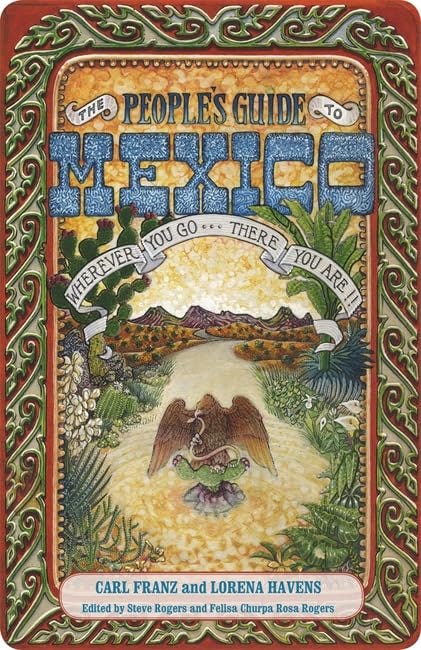For a hot minute there about ten years ago U.S. Customs welcomed you home with these wild dot potraits. This was Jenny and I landing at LAX (I think) in 2015. You couldn’t even keep them! They took our headshots, then the officer printed them out on a fat receipt and bade us deliver them to the next desk. We shuffled across the stateless linoleum, staring at our stippled faces. The joke back then was that we’d finally earned our own Wall Street Journal hedcuts.1 When I look back now all I see are ghosts. Are we re-emerging from the fog as we stagger off the night flight from Shanghai? Or are these scattered dots all that made it home?
I thought of these dear ghosts while reading the recent discourse in Substack’s House of Expat. The question at hand: Can moving to another country fix you?
One side—we’ll call them the Fixies—say yes, absolutely, place is everything, and go for it.2 See the footnotes for links. I’ve named them in the NZ tradition of diminutive group nicknames. Electricians here are sparkies, if you can believe it.
The other camp I’ll call the Wherevers. They counter that life is life anywhere, countries are not life hacks, and we should all stop blowing smoke for the folks back home.3 I take their name from the old line Wherever You Go, There You Are, which once graced the cover of a guidebook many Americans, including my parents, carried around Mexico in the ‘70s. The Fixies think this isn’t true. The Wherevers do.
Who’s right? I mean, of course a new place changes you, except when of course it doesn’t, and we’ll haggle over subjective experience until we die. But the haggling thus far is missing something, I think, and not just the blindspots of a mostly Global North conversation. We’re missing the receipt they hand you at the border. We’re missing the ghosts.
An Amazing Mirror
“All it took was a change of location and I had an amazing new life,” writes Team Fixie’s
in Change Your Location, Change Your Life. She’s talking here about leaving Alaska for college in the Lower 48, but it also serves as a thesis for the whole team. She’s rightly sick of the American mess and will now divide her time between DC and the bootheel of Italy. Her argument is not that place will fix you, but that moving can fix, or rather swap out, the place around you. It’s a smart line to draw, one blurred elsewhere in the discourse. But her promise of an “amazing” solution reads uncomfortably like ad copy.It’s a very American thing, to believe we’re all one smart move away from total personal reinvention. But sometimes our faith comes wrapped in an almost moral righteousness about consumer choice. Fellow Fixie
’s post Europe Will Change You describes his fellow expats in Barcelona (emphasis his): “They know that where you live is a direct reflection of your values and lifestyle.” I don’t know, man. I love cafe culture too—who doesn’t?—but this makes Spain sound like a snappy new pair of hiking boots. These are countries, not mirrors. They’re not even ours. The reflection is never direct.Fear of a Lost Soul
Where does the Fixie argument go when the consumer model breaks down? Team Wherever’s
wrote Europe Will Not Fix You in direct response to Powers’ viral manifesto about leaving America. She nods at Powers’ criticisms of the U.S. but finds herself “amused and then horrified” that Powers names Italy as a cure-all. This fantasy, Elizabeth writes, is just the latest turn of an Expat Industrial Complex running all the way back to Peter Mayles’ blockbuster memoir A Year in Provence (1989). It’s a pipe dream that hides both Italy’s own problems and the unavoidable pains of living abroad.But what really caught the Fixies’ attention were the losers. Three of them anxiously cite Elizabeth’s line about the deadbeats she’s known: “the untold alcoholics, lost souls, and troubled ex-pats I’ve met during my decades abroad—most of them running from something, rarely to anything.”
admirably reckons with the possibility he might be a lost soul himself. Wiesner, though, is puzzled. His expat Barcelona knows only strivers, the sort of folks “focused on self-development, living a healthy lifestyle, and establishing strong social connections.”I don’t know, y’all. Europe used to have plenty lost American souls! Hemingway’s grim expat classic “Hills Like White Elephants” is about two drunk Americans arguing over an abortion at a train station between Barcelona and Madrid. Maybe the continent’s too pricey now, or no longer exotic enough? I’ve known plenty such drifters across Latin America and Asia. The former Texas doctor in a rural Honduras compound of white tiled floors and drawn curtains, attended to by a local house boy who rubbed cream on his back. The red-faced creeps on the Beijing train talking dirty about underage girls. Middle-aged dudes in bare rented rooms with little discernible employment or purpose. The women are out there too, though they perform purpose better. English teachers everywhere, borrowing lesson plans to get through the hangover. All the regulars at that Shanghai metal bar. Most of ‘em ain’t evil. The doctor in Honduras treated kids from our village for free. Some are functional alcoholics, some incompetents, some loners fleeing families or failures never named. At their best they’re characters in a Charles Portis novel, and make great company for a long night at the bar. Some I’ve been lucky to call friends. Sometimes the lost soul was me.
The Price of Dots
A dot-portrait soul is not necessarily lost. At best you’re a cosmopolitan superhero, a cloud of memories reassembling wherever you land. You meet new folks and eat the world and grow wiser every day. Writing it all down helps. Teaching helped, too. A classroom anywhere can be a home.
In the hard years, though, you’re naked. You’ve shed your native colors and textures, and a strange wind blows through the blanks. In such a state we huddle, we wither, we drift. We draw the curtains and circle old talismans. A bottle, sometimes. But in those haunted stretches we know what the Fixies don’t talk about. We know leaving’s cost.
hasn’t chosen a side (UPDATE: he’s not alone.4) But he takes a moment in his otherwise aspirational post Living Abroad Changed Me as a Person to count the cost. “[W]hen we strike out on the lonely journey across the sea, we lose much of what we have had,” he writes. “Indeed, we lose a part of our identity—a part of ourselves.”You want your loss served hotter, you won’t beat
’s Things They Never Tell You. She’s a Brit who’s lived in Portugal for yonks. Loves it, I imagine, but she’s got the receipts. Your homeland moves on. People back home drift away. You’re an outsider who will never share your neighbors’ pasts, nor they yours. “They never told me,” she writes, “that I would never feel like I belong anywhere, ever again.”A Day Spent Here
This loss—this is the change we seek when we move abroad. Its beginning, anyhow. Some folks leave to lose a burning house. Some folks, like me, just walk out the door. I’m not sure why. I’m writing now in a Wellington branch library, watching the pohutukawas outside bend hard in the wind. Fixies and Wherevers both seek this motion. I couldn’t have left home without a Fixie dream in my heart. I stay out to catch those cold, clear gusts of Wherever. The empty beaches here are full of ‘em.
The Fixies may protest that they’re not lost. They picked a new home and they already belong. Good on ya, mate. Learn the language, cook meals for near strangers, and hear the old stories. Do the mahi, and some new color will bleed back into your dotted face. But when you write the story—and please keep writing, all y’all!—don’t sell the cure without naming the price: a day spent here is a day spent not there.
Has NZ fixed me? Aotearoa sheltered us through the pandemic, and more rainy days than I can sort here. I drink tea now. I watch the skies more. I listen for the birds. I’m bowling tonight with friends. I take a numb comfort in our distance from whatever the hell’s happening back home. My life is, quite literally, full of stars and rainbows.
But if I stay here forever, how many more enchiladas will I eat? How many more proper Texas margaritas will I drink, sour and green and cold, with friends who knew me last century, sitting together outside on a tar-melting desert night? How many more times will I see my parents alive?
I can’t leave it there. I must leave it there.
Elizabeth Bishop, take me home:
I lost two cities, lovely ones. And, vaster, some realms I owned, two rivers, a continent. I miss them, but it wasn’t a disaster.
—Even losing you (the joking voice, a gesture I love) I shan’t have lied. It’s evident the art of losing’s not too hard to master though it may look like (Write it!) like disaster. //
Weird old newspaper slang for a small portrait. A woodcut that goes near a headline (‘hed’).
A few In-Betweens:
, Living Abroad Changed Me as a PersonGregory also appeared on
’s podcast. Well worth a listen!, A beautiful existence or a full life?







Melancholy. It just zips itself into your baggage and goes wherever you go. Beautiful as ever, Dan
Dan, thanks for mentioning the Based In Paris Immigrants Bill of Rights. I liked this part of your article, "...don’t sell the cure without naming the price: a day spent here is a day spent not there."
People often misunderstand that living abroad is a trade-off, not a cure.
A lot of the "Fixies" I read do not live in their new country full time, work for a European company w/ a European salary, have kids in public schools. And, like in Portugal and Spain, may not be subject to the same taxes as locals. Or, in France, they live under the tax threshold to avoid France's high marginal tax rates. When they "split their time", it is usually to, understandably, legally avoid the taxes. (Not starting a policy debate. It is a fact Europe has high taxes.)
I am not calling them *bad*, but they don't paint a full picture.
Of course where we live matters! I lived in Chicago for years, and it just wasn't for me. But, I loved DC.
I wish everyone well on their journey. I wish everyone generosity of spirit towards those whose journey takes other twists and turns.
PS- Perhaps there is a metaphor in there that with the decline of traditional media, everyone struggles to live in the gray. ;)